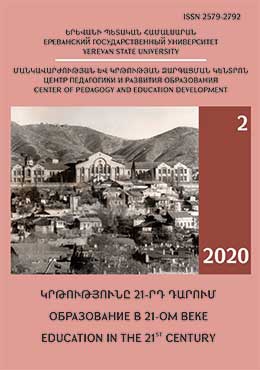THE ABILITY TO HANDLE STRESS AS PSYCHOLOGICAL AND PEDAGOGICAL PROBLEM
DOI:
https://doi.org/10.46991/educ-21st-century.v2i4.10965Keywords:
stress, professional stress, stress resistance, stress factor, civil aviation, pilot, professional activityAbstract
Scientific achievements of researchers, who have studied the problem of ability to handle
stress in various fields, which made it possible to set definitions, are analyzed in the article: stress
– as a special reaction of the body to extrinsic stimuli; the ability to handle stress – as a personal
characteristic of resistance to negative factors; and the key definition is withdrawn – the
professional pilots ability to handle stress – the personal characteristic which gives the aviation
specialist an ability to adapt and be emotionally stable under the influence of stressors and
maintain high efficiency during working practice.
It is pointed out that different types of occupational stress, such as informational, emotional
and communicative stress have been differentiated. As for the professional activity of aviation
specialists, the following negative factors are singled out: high neurotic-emotional tension; unusual
spatial orientation; imposed work speed and lack of time; the presence of unusual professional
conditions of activity, which include such as noise, aircraft chatter vibration and acceleration state
during performing various maneuvers; the advantage of brain work and almost complete absence
of physical effort, the presence of hypomobility and physical inactivation, etc.
228
The specific of the work of pilots lies in the special conditions of activity. In different modes
of the technological process, the pilot performs his functions in the system, where control is
carried out by automatic air navigation systems. The specific of the work of pilots is determined in
a number of ways: 1) high speed of technological process development; 2) processing large
amounts of information in a short period of time; 3) the sense of responsibility and the cost of error
in working practice; 4) the rapid transition from waiting period to strenuous work; 5) the intensity
of work; 6) the rapid change of meteorological conditions; 7) negotiation monotonous noise
factors; 8) the constancy of visual images while observing a cloudy sky, flying in complex ones.
Summing up what has been said, aviation workers belong to the category of people with a
high level of occupational stress. There are main indicators of psychological readiness to perform
professional tasks under stress such as adaptive abilities to stress, professional reliability and the
ability to handle stress. Therefore, the formed ability to handle stress ensures the successful
performance of professional duties, maintains high efficiency during the action of stress factors,
which is an important condition for the professional activity of aviation professionals. In contrast,
undeveloped ability to handle stress is characterized by an inability to perform professional duties
in extreme situations, which can lead to both health problems and negative consequences in
professional occupation.
References
Галуненко О. А., Особенности психической деятельности пилотов при возникно-
вении экстремальных ситуаций в полете. Проблеми соціальної роботи: філософія, психо-
логія, соціологія, 2018, № 1 (11), с. 19-25.
Дранко А. А., Педагогічні аспекти формування лідерських якостей курсантів-
пілотів під час наземної підготовки. Проблеми інженерно-педагогічної освіти. 2013. № 38-
URL: repo.uipa.edu.ua/jspui/handle/123456789/2619.
Дубчак Г. М., Психологія становлення професійної стресостійкості майбутніх
фахівців соціономічних професій: автореф. дис. на здобуття наук. ступеня д-ра. псих. наук:
00.07. Київ, 2018, 36 с.
Корольчук В. М., Обгрунтування організаційної моделі дослідження
стресостійкості особистості. Проблеми екстремальної та кризової психології. 2010, № 7, с.
-218.
Куликов Л. В., Психогигиена личности. Вопросы психологической устойчивости и
психопрофилактики: Учебное пособие, СПб.: Питер, 2004, 464 с.
Покровский Б. Л., Летчику о психологи, 2-е изд., перераб. и доп. Москва, 1984, 100 с.
Плачинда Т. С., Особливості підготовки курсантів льотних навчальних закладів з
урахуванням негативних чинників майбутньої професійної діяльності. Вища школа:
науково-практичне видання Міністерства освіти і науки України / ред. кол.
К. М. Левківський (головний редактор) та ін. К.: «Знання», 2016, № 5, с. 57-65.
Плачинда Т. С., Формування професійно важливих якостей у майбутніх фахівців
екстремальних професій, як складова підвищення ефективності їх фахової підготовки.
Науковий вісник Льотної академії. Серія: Педагогічні науки. Збірник наукових праць /
Гол. ред. Т. С. Плачинда. Кропивницький: ЛА НАУ, 2018, Вип. 4, с. 176-184.
Плачинда Т. С., Формування емоційної стійкості майбутніх пілотів засобами
фізичної і психофізіологічної підготовки. Вісник Національного авіаційного університету:
зб. наук. праць, К.: НАУ, 2011, № 2 (47), с.170-176.
Самоукина Н. В., Психология и педагогика профессиональной деятельности:
учебное пособие, Издв. ЭКМОС, 1999, 352 с.
Downloads
Published
How to Cite
Issue
Section
License

This work is licensed under a Creative Commons Attribution-NonCommercial 4.0 International License.

